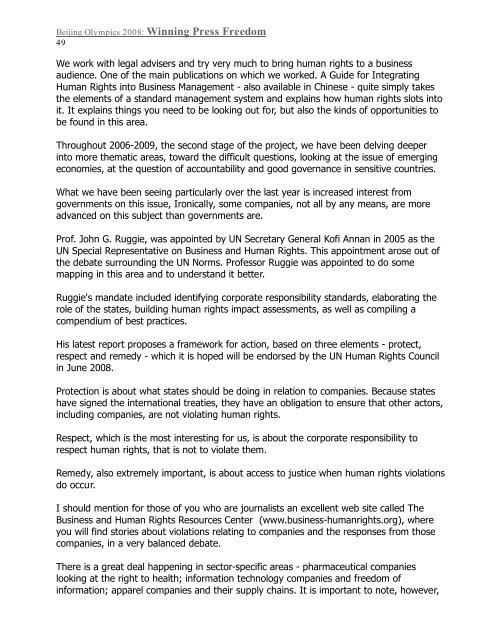Beijing Olympics 2008: Winning Press Freedom - World Press ...
Beijing Olympics 2008: Winning Press Freedom - World Press ...
Beijing Olympics 2008: Winning Press Freedom - World Press ...
Create successful ePaper yourself
Turn your PDF publications into a flip-book with our unique Google optimized e-Paper software.
<strong>Beijing</strong> <strong>Olympics</strong> <strong>2008</strong>: <strong>Winning</strong> <strong>Press</strong> <strong>Freedom</strong><br />
49<br />
We work with legal advisers and try very much to bring human rights to a business<br />
audience. One of the main publications on which we worked. A Guide for Integrating<br />
Human Rights into Business Management - also available in Chinese - quite simply takes<br />
the elements of a standard management system and explains how human rights slots into<br />
it. It explains things you need to be looking out for, but also the kinds of opportunities to<br />
be found in this area.<br />
Throughout 2006-2009, the second stage of the project, we have been delving deeper<br />
into more thematic areas, toward the difficult questions, looking at the issue of emerging<br />
economies, at the question of accountability and good governance in sensitive countries.<br />
What we have been seeing particularly over the last year is increased interest from<br />
governments on this issue, Ironically, some companies, not all by any means, are more<br />
advanced on this subject than governments are.<br />
Prof. John G. Ruggie, was appointed by UN Secretary General Kofi Annan in 2005 as the<br />
UN Special Representative on Business and Human Rights. This appointment arose out of<br />
the debate surrounding the UN Norms. Professor Ruggie was appointed to do some<br />
mapping in this area and to understand it better.<br />
Ruggie's mandate included identifying corporate responsibility standards, elaborating the<br />
role of the states, building human rights impact assessments, as well as compiling a<br />
compendium of best practices.<br />
His latest report proposes a framework for action, based on three elements - protect,<br />
respect and remedy - which it is hoped will be endorsed by the UN Human Rights Council<br />
in June <strong>2008</strong>.<br />
Protection is about what states should be doing in relation to companies. Because states<br />
have signed the international treaties, they have an obligation to ensure that other actors,<br />
including companies, are not violating human rights.<br />
Respect, which is the most interesting for us, is about the corporate responsibility to<br />
respect human rights, that is not to violate them.<br />
Remedy, also extremely important, is about access to justice when human rights violations<br />
do occur.<br />
I should mention for those of you who are journalists an excellent web site called The<br />
Business and Human Rights Resources Center (www.business-humanrights.org), where<br />
you will find stories about violations relating to companies and the responses from those<br />
companies, in a very balanced debate.<br />
There is a great deal happening in sector-specific areas - pharmaceutical companies<br />
looking at the right to health; information technology companies and freedom of<br />
information; apparel companies and their supply chains. It is important to note, however,





